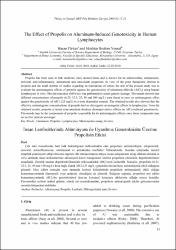The Effect of Propolis on Aluminum-Induced Genotoxicity in Human Lymphocytes
Citation
Türkez, Hasan., Ibrahim Yousef, Mokhtar. "The Effect of Propolis on Aluminum-Induced Genotoxicity in Human Lymphocytes." AKU Journal of Science 9, Sayı.2 (2009) : 15-21.Abstract
Propolis has been used in folk medicine since ancient times and is known for its antimicrobial, antiparasitic, antiviral, anti-inflammatory, antitumoral and antioxidant properties. In view of the great therapeutic interest in propolis and the small number of studies regarding its mechanism of action, the aim of the present study was to evaluate the antimutagenic effects of propolis against the genotoxicity of aluminum chloride (AlCl3) using human lymphocytes in vitro. The micronucleus (MN) test was performed to assess genetic damage. The results showed that different concentrations of propolis (6.25, 12.5, 25, 50 and 100 mg/L) were found to exert an antimutagenic effect against the genotoxicity of AlCl3 (25 mg/L) in a dose dependent manner. The obtained results also showed that the effective antimutagenic concentrations of propolis had no clastogenic or aneugenic effects in lymphocytes. From the obtained results, propolis at tested concentrations displays chemopreventive effects on AlCl3-induced genotoxicity. Flavonoids may be the components of propolis responsible for its antimutagenic effects, once these compounds may act as free radicals scavenger.
Source
Fen Bilimleri DergisiVolume
9Issue
1Collections
- Cilt 9 : Sayı 2 [11]



















